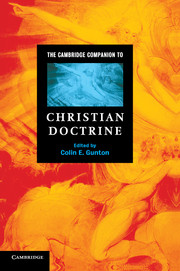Book contents
- Frontmatter
- Part one Christian doctrine in the late twentieth century
- 1 Historical and systematic theology
- 2 On doctrine and ethics
- 3 The basis and authority of doctrine
- 4 The scope of hermeneutics
- 5 Christ and the cultures: The Jewish people and Christian theology
- 6 Christ and the cultures: Christianity and the arts
- Part two The content of Christian doctrine
- 7 The triune God
- 8 The doctrine of creation
- 9 Human being, individual and social
- 10 Redemption and fall
- 11 The church and the sacraments
- 12 Eschatology
- 13 Jesus Christ
- 14 The Holy Spirit
- General index
- Index of biblical references
7 - The triune God
Published online by Cambridge University Press: 28 May 2006
- Frontmatter
- Part one Christian doctrine in the late twentieth century
- 1 Historical and systematic theology
- 2 On doctrine and ethics
- 3 The basis and authority of doctrine
- 4 The scope of hermeneutics
- 5 Christ and the cultures: The Jewish people and Christian theology
- 6 Christ and the cultures: Christianity and the arts
- Part two The content of Christian doctrine
- 7 The triune God
- 8 The doctrine of creation
- 9 Human being, individual and social
- 10 Redemption and fall
- 11 The church and the sacraments
- 12 Eschatology
- 13 Jesus Christ
- 14 The Holy Spirit
- General index
- Index of biblical references
Summary
INTRODUCTION
Friedrich Schleiermacher; the great 'Father of Modern Theology', at the end of his magnum opus, The Christian Faith, insightfully identified the 'being of God in Christ and in the Christian Church' as the main pivot for the ecclesiastical doctrine of the Trinity, only to go on to state that in his judgement they could stand independent of it. No evaluation before or since better captures both the necessity and ambiguity of the doctrine. It is the perspective of this essay that the Christian doctrine of God requires a confession of the Holy Trinity.
Clearly, though, one cannot separate the Christian understanding of God as Trinity from the religious monotheism of its closest two relatives, both of whom along with Christianity lay claim to Abraham as their ancestor. The conviction that the one unsurpassable God is self-revelatory in word and deed is the common testimony of Judaism, Christianity and Islam.
- Type
- Chapter
- Information
- The Cambridge Companion to Christian Doctrine , pp. 121 - 140Publisher: Cambridge University PressPrint publication year: 1997

